Field Notes of Orek bi Łestkin, Amateur Ethnographer/Cache 1
5.II.1660
- Reached encampment at "Banaash". Map indicates this is former Benacia Hamlet, former Benaciastadt. Outer parts of the city look intentionally leveled, left waist-high to human height, gaps between buildings filled, basements still in active use. Many young men and women armed with guns of questionable quality.
- Banaash Center has standing structures.
MostAll roofs - tent material.
- Main marketplace sells a wide variety of goods. Wooden booths and tent roofs. Tellian booth sells electronics
- Sign: "Myłk°eć'ehe Mameblenemć'e". My guide can't read, I attempt to sound it out. Guide made faces, talks with traders:
- "New assets from Mameblene" ?
- Closer inspection, some looks militarygrade
- Sales conducted in bullets, food, persons
- Housing secured for me and my guide, extra because guide is not sworn to the "prince"?
- says word also can mean "spear", also "father-in-law"
- Consider
replacing guideselling guide, buying someone literate
- or
- learn local language?
6.II.1660
- Need to find way to conserve resources. Erbs don't seem to carry with these people.
- Guide needed to speak roughly and quickly with aggressive local.
- One pistol round used to mean business.
- Laughing merchant attempted to sell me pistol of questionable quality. Refused, and the man spat at my feet.
- A drawing ... had the words "ROYAГORDNCЄ" stamped all over to mark safety ? joint for action along barrel &c
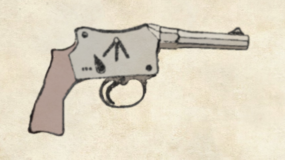
7.II.1660
- One pistol rounds traded for half an hour's use. Overpriced.
- The adaptation to subterranean living seems to be a response to the aggressiveness of the Tee-Al. Habitation above-ground is limited to the old city center and leaders among the Black Brothers. Many areas have extensive tunnels to connect several basement homes together.
- Saw Lachs dressed in black robes send off two donkey carts of goods along the western road. Guide objected to a closer look. Looked to be light artillery pieces and old rifles. Some of Imperial manufacture, others not. The Lachs escorting these carts armed themselves with quality goods, not the questionable pistols that the others carry on their belts.
- Local Lach offered two slaves for my horses: one man looked mid-30s, one boy brutish. Guide suggested I demand seven slaves for my ride, including a delicate boy. I refused to bargain. Guide was not pleased, but relayed my message after I insisted that I did not wish to sell my horses. Local Lach spit at my feet and departed.
- Locals will price high and expect heavy-handed haggling.
8.II.1660
- Met Prince/Spear/Father-in-Law of Banaash to discuss stolen horse. Angry that I'm questioning and insulting the locals. Demanded I leave before nightfall.
- Acquired supplies, local attempted to sell local-made rifle. I declined. Local spat at my feet. My guide spoke to a cloud, so I bartered myself with the few words I've picked up. They haggle like they have leverage
- Three rifle rounds bartered for goods. Declined meat.
- Horses laid up to carry pack, walking on foot.
9.II.1660
- Western road has turned northwest.
- Encountered farming community, uses an irrigated channel to redirect river water to their farm.
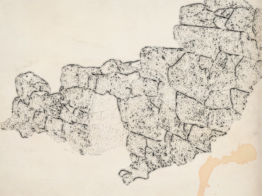
- Found rock wall partially buried in soil and vegetation. Style does not resemble Ashkenatzi or Minarborian, weathering suggests extraordinary age. Locals call it an Aashwadapk Guide says this means "Shield Wall"
- the wall is located on the northern side of a ridge north of the community
- Standing in the gateway. To my left, I can see the foothills clawing up towards the mountains of Kalgachia. They become shallower towards my center of view. In the distance, I can see a pair of mountains masked by haze. To my right, more hills, rolling, meager height.
- This used to be White Litovina.
- Far beyond the horizon should be Mishalan and the frontier patrols of the Imperial Army.
- successfully bargained with the leader of the farming commune, calls himself "Yaatash"
"Father's Brother""Uncle". They live in the hills Tee-al protection? - had to share bed with adolescent boy with with aggressive look to him
10.II.1660
- Uncle agreed to house us if we used the horse to move some large stones to the irrigation channel and help shore up the walls. Stones are a short walk west.
- I suspect that "Uncle" may be a euphemism
- Stones are from another ancient stone wall, worse physical condition. Looks like the locals have been picking this one apart for years.
- The Lachs seem to enjoy telling stories over their supper. Some are deeds of the Uncle. Some are stories about quarrels between the stars (zhwaarwa). One was a deed by the Uncle's
greatgrandfather? when the Lachs entered the fallen Letwav? realm, made slaves of the people of the land and took their women. The Uncle laughed heartily at this story and elbowed one of the old women in the community. 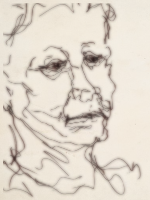
- Quick Sketch of Old Woman
- The Uncle dismissed the feast.
- Sat out under the stars until the fires were put out. Waxing Quarter.
- Small person wrapped in a yellow cloth is taken to the Uncle's door. My bedmate then comes to summon me. Something about a knife if I wake him.
11.II.1660
- Second night sharing bed with the aggressive boy. He keeps a knife by his side. Did not see previous night.
- Uncle attempted to bargain for one of my horses. His offer was two children, one male one female. My guide told me to demand five pshaashas and the child in yellow, for they are fine horses that I depend on. He also told me to rest my hand on my pistol while he gave these words.
- The Uncle says that we can bargain again later, once I have no need for the horses.
- We departed northward from the farming community, back towards the road.
- pshaasha means a young woman
- yellow linen body wraps are worn by wedzhekwa ?
12.II.1660
- Following river. Cannot find on Ashkenatzan topographic map. Seems to overflow it banks at several points along the river.
- Encountered another farming community. My guide exchanged pleasantries but we did not stay.
- Encamped under a fallen tree. Woods are starting to get thick, and we are making our way west southwest towards the mountains again.
- According to my guide, the best time to cook food is in the late afternoon and wait until evening to eat it. Cooking at night will attract unwanted attention.
13.II.1660
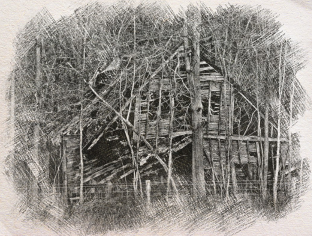
- The river has widened and shallowed. The soil everywhere is heavy with water. Taking a wide path to avoid the worst of it. Deep in trees.
- Found an abandoned house. No evidence of recent habitation.
- Construction is entirely wooden. Rusted iron nails barely hold the structure together as it is.
- Could not find personal items except rusted iron that I could not recognize. I chose to leave things in situ as best I could, so that a proper archaeology team might be able to identify the belongings and the identity of the house.
- Despite the lack of any signs of habitation, my guide initially refused to encamp within the house. I set up the picket lines for the horses near the mouth of the gaping hole on the southeastern corner of the structure. I intentionally made preparations to cook supper late to entice him to encamp with me inside and correct my bad light discipline.
14.II.1660
- Found meadow in the forest, allowed horses to graze.
- This stop in our journeying back into the mountains allows my guide and I to perform some maintenance on the tent, which now has a tear in its roof.
- Encountered deer. My guide wanted to use a pistol to kill it. I insisted on the rifle.
- 1 rifle round expended. My rifle marksmanship badge was earned.
- We set up the tent in the center of a cluster of trees, established a more durable picket line for the horses. Have not seen any others since we entered the deeper woods.
16.II.1660
- We were tracked by some Lachs on foot.
- 5 rifle rounds, 3 pistol rounds expended. My guide is a better shot at the pistol than I had expected. He had his pistol on hand when the Lachs tracking us blew their cover. I didn't hear it myself, but my guide says that one of the young ones had been too inexperienced.
- Two older men, two younger men in total.
- We've tied the surviving one, a boy perhaps fourteen years, up so that his hands are together in the knot of his back, and his arms are tied to his flanks. His mouth was gagged until he took an oath not to call out for help. My guide seemed to be satisfied, but I keep my pistol with me now.
19.II.1660
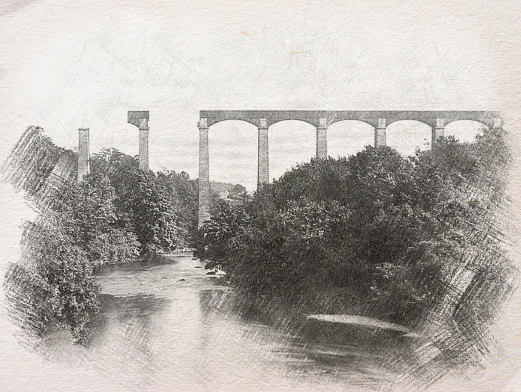
- Aqueduct, possibly Ashkenatzan. It breaks down and degrades as it heads southeast, away from the mountains. To the northwest, towards the mountains, it looks to be in good condition. Water flows freely down each of the support pillars. Standing between two pillars, I can feel a mist of water washing over me.
- We let our captive wash. My guide wants to know what I intend for the boy. I tell him I have none. My guide tells me that we should continue holding him until his family comes finding him, then we bargain. Once we have bargained, we will need to trace our steps back to the other three bodies so that they can be buried.
- Personally, this is a waste and it is stupid, but I tell him that I agree.
- Curiosity regarding the mystery river solved, we will encamp on the northern side of the river, then make our way northward.
20.II.1660
- Young boy is finally eating.
- His name is Shaway, son of Dzadzoo (one of the men we left to rot).
24.II.1660
- Small trading village. No non-Lachs, but the merchant here is semi-literate and trades with Van (Vein?)
- Adding final comments to these notes to send back home to father.
Letter to Father
Hello Father,
Existence beyond the Imperial frontier is indeed possible!
I have trekked across the Central Benacian Green for almost a month now. I have traded insults with merchants. I have defended myself against marauders. I have made use of the women. I have bartered for a young man's life.
I was not able to see this package off to the border station myself, but I was able to bargain using the guide you purchased for me. It turns out that he isn't a bad shot himself, if only when he is using a real firearm.
These notes are short because I wanted to send them home as soon as I had the opportunity. Even so, I have included a map based on my compass readings and read of the topography, to show the path we have taken so far. I also include some sketches of the things I have seen.
Tell Mother I love her and that I seem to have grandpa's knack for drawing.
Love,
Orek